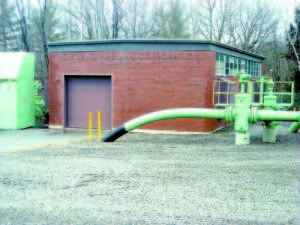Citizen wages tar sands battle

One of the Portland Pipe Line Company’s pump stations is located near the Raymond-Casco line. (De Busk Photo)
By Dawn De Busk
Staff Writer
CASCO — A Casco resident, who was involved in the collection of signatures to put an anti-tar-sands resolution before the citizens in her town, has focused her energy on what is happening in South Portland.
During the November elections, Peg Dilley volunteered at the headquarters for the Natural Resources Council of Maine (NRCM). She said she assisted by phoning eligible voters on Election Day.
“We were up that night calling until the last person could vote,†she said.
“This was a hard-fought campaign in Portland,†Dilley said.
At stake was a measure to keep tar sands out of South Portland by stopping the expansion of smoke stacks on property owned by Portland Pipe Line Company (PPL).
The measure, referred to as the Waterfront Protection Ordinance, was rejected by the majority of Portland voters.
But, that does not mean the battle is over, Dilley said.
Lately, she has been attending South Portland City Council meetings, closely following a proposed moratorium to delay for six months the construction of additional smoke stacks at the city’s port.
According to the NRCM, putting in the smoke stack infrastructure will be integral to off-loading tar sands oil, also called diluted bitumen, from the pipeline to awaiting tankers.
On the other hand, representatives of PPL have repeatedly stated that there are no immediate plans to utilize the pipeline for the transport of diluted bitumen.
According to Dilley, if residents do not get involved and speak out before the city council votes, it will diminish all the efforts of the small rural towns along the Crooked River and Big Sebago Lake.
“We will be flushing everything down the toilet,†she said.
The Towns of Casco, Waterford, Bethel, Raymond, and Harrison, were among those towns that passed resolutions opposing the transport of tar sands oil.
The resolutions are not legally binding, but officially state each town’s opposition to diluted bitumen being transported via pipeline. The resolution in Casco also asks state and federal lawmakers to explore alternative sources of energy, and to support the reduction of carbon dioxide emissions.
Dilley said that Casco residents should not get complacent, thinking that passing the resolution was enough to stop PPL from possibly pursuing plans to reverse the flow direction, and pump Western Canadian tar sands through Maine.
In an e-mail in early May, PPL Communications Consultant Ted O’Meara said that the company has already tested heavy crude on the existing pipelines.
“We have moved limited volumes of Western Canadian crude through our system in past years in full compliance with our specifications, operating parameters, laws and regulations,†he said.
He declined to say how many gallons were pumped through the pipeline, citing legally-sanctioned protection of the customer.
“Federal regulations do not allow us to disclose detailed shipper volume information to third parties,†O’Meara said.
Also, in an earlier e-mail, O’Meara said the oldest pipeline, which was constructed in the 1940s, is idle. The other two pipelines are currently in use, transporting conventional crude oil, he said. He confirmed that the newest pipeline was built in 1965.
O’Meara said that PPL does not have plans “at this time†to reverse the flow of its pipeline, and move tar sands from Western Canada to Portland.
But, Dilley does not believe PPL representatives’ avowals that there are no plans to transport tar sands through the pipelines that run through her stomping grounds.
While the watershed of western Maine and the Lakes Region would be at risk — if a spill were to occur, South Portland’s air quality will be jeopardized if the smoke stacks are built, she said.
Dilley shared her concerns during public participation time at a Nov. 19 Casco Board of Selectmen meeting.
“We cannot stop working on this project. If South Portland is willing to take on smoke stacks,†the oil company will have the ability to transport and off-load tar-sands oil, she said.
“We have to become more active, we haven’t done our share,†she said.
Dilley said that some residents from Waterford have also attended the council meetings in South Portland. The topic warranted discussion and comments that lasted about 2 and a half hours, she said.
“This is important. We need to be more involved,†she said.
The South Portland City Council will hold its regular meeting on Monday (Dec. 16) starting at 7 p.m. in the City Hall council chambers. On the agenda is the second reading of the proposed moratorium to delay any construction of smoke stacks in the waterfront district. It is likely there will be a vote on the moratorium that night.
According to the South Portland website, public comment is allowed during both regular meetings and workshops.
“For us out here, we need to be at some of these meetings so (that) they (South Portland councilors) can be aware there is a lot more at stake than just Portland,†Dilley said.
v

